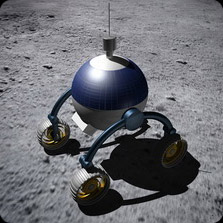Background
December 19, 1972, the last time humans had a presence on the moon with the Americas Apollo 17. Since then, only two vehicles have patrolled the surface, the Soviets Lunokhod 2 which stopped operations in 1973, and Yutu lunar rover which became immobile after 42 days of operation in 2014. The XPRIZE committee would like to change that.
It has been more than a decade since the first major XPRIZE competition was completed when SpaceShipOne successfully flew a suborbital spaceflight (62.5 miles) above ground level. Some attribute the XPRIZE competition as one of the reasons the private industry gained interest in developing technologies in space.
In 2007, The Google Lunar XPRIZE was introduced. The goal of the prize is to inspire a new generation of private investment in space exploration and technology. The challenge calls for teams to compete in successfully launching, landing, and operating a rover on the lunar surface by the end of 2017.
What's at Stake?
Fame of being the first private company to land on the moon and…
- $20 Million for the first team to complete the challenge
- $5 Million for second place
- $5 Million bonus prizes
- Bonuses include traveling over 5,000 meters and survival of a lunar night
The Finalists
The competition drew 32 teams from around the world but was narrowed down by an XPRIZE announcement this last January. The five finalists are: SpaceIL, Moon Express, Synergy Moon, Team Indus and Hakuto, all securing launch contracts for 2017, with SpaceX, Rocket Lab, Interorbital Systems and ISRO respectively.
Team Indus (India)
Launch - Dec, 28 2017 with the Indian Space Research Organization aboard a PSLV rocket
Budget - $70-$75 Million in private investment
Vehicle - HHK-1 lander, 11-lb. solar-powered ECA rover
Plan - Let rover move along at a top speed of 4 inches per second
Hakuto (JAPAN)
Launch - December launch date with the Indian Space Research Organization
Budget - $10 Million in private investment
Vehicle - Moonraker rover, which will hitchhike on Team Indus lander
Plan - Race head on with ECA rover at about the same top speed
SpaceIL (Israel)
Launch - 2017 launch as a secondary payload onboard SpaceX Flacon 9.
Budget - $36 Million in private Investment
Vehicle - Sparrow lunar lander
Plan - Upon landing, spacecraft will do a 500-meter hop using rocket propulsion
Moon Express (United States)
Launch - With the New Zealand Start-up Rocket Lab, date unknown
Budget - Investments not yet reported
Vehicle - MX-1E lander
Plan - Will engage thrusters to hope and cover required distance
Synergy Moon (International Collaboration)
Launch - Unspecified date onboard Interorbital Systems’ NEPTUNE L-1000 rocket.
Budget - Investments not yet reported
Vehicle - Neptune rocket will carry CYGO Cruiser which will release a TubeSat and Lunar Lander that will deploy 2 rovers.
Plan - Aiming for the top XPRIZE and other additional science experiments






